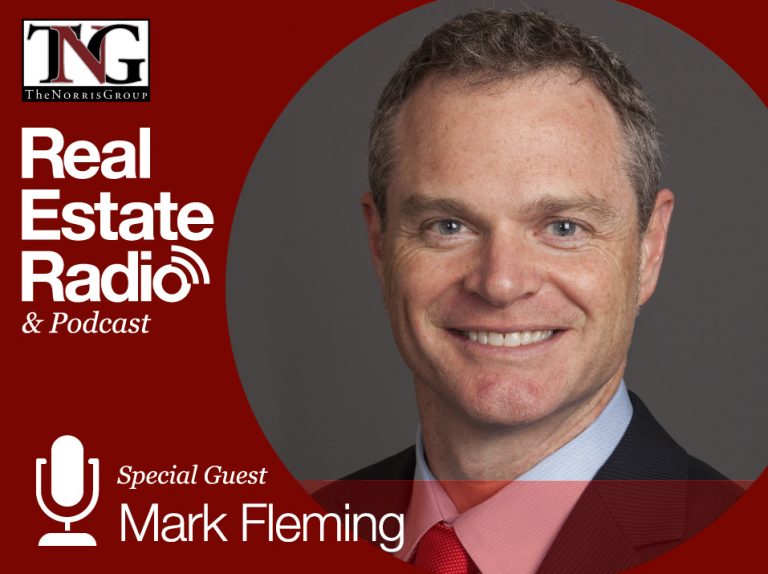Bruce Norris is joined this week by chief economist of First American Corelogic, Mark Fleming. First American CoreLogic, Inc. is the nation’s largest provider of advanced property and ownership information, analytics, and solutions.
Mark starts by explaining what Corelogic’s Core Risk Monitor is and what it evaluates. This evaluation tool is used to forecast mortgage default risk areas. The report makes use of house price dynamic trends, economic trends, foreclosure delinquency trends and collateral risk trends. Bruce asks of those trends which is the one that causes the others to follow. Mark says the economic and house price trends are the most important. Issues with price decreases and the ability for people to pay their mortgages continue to create problems.
Bruce asks if the downturn from 1991-1997 in California is following the same model we are seeing today. Mark says it’s slightly different. Mark says in the 90s it was more a function of unemployment. This time around, the house price downward trend is causing more of a problem. The economic downturn is following.
Bruce asks if the core factors are different for different states. Mark says yes but these two primary conditions are key. Mark talks about the Midwest and how their market has changed and reacted.
Bruce asks Mark about his take on affordability and if increasing affordability means less risk. Mark says that increasing affordability means more individuals will be able to enter the market on the demand side and means that inventory will be able to stop the price slides. There are a few steps along the way to get the market really going but affordability is important.
Bruce asks about Corelogic and how much emotions play part in the economy. Mark talks about the emotions to prices and houses and how individuals don’t like to lose. Bruce talks about people and the fear of people not wanting to buy for fear of losses. Mark says that some homes become such a good deal they get back in anyway.
In Corelogic’s report in the 3rd quarter of 2007, Bruce asks how Ohio and Michigan topped the highest risk market but aren’t in this year’s report. Mark says it wasn’t that they improved, other markets got worse. In Corelogic’s 3rd report of 2008, California has 8 of the top 10 riskiest markets and did not appear in their 2007 report. Mark says the price declines got these areas on the list.
Bruce talks about the historic nature of price declines in California and how it’s the worst he’s ever seen. Mark says even nationally it’s bad. What once were the top markets are doing so poorly it’s bringing down the national numbers. California and Florida are seeing large price declines and they are two of the largest markets. Historically, housing recessions are more localized.
Bruce asks about the percentage of houses that are upside down in California. Mark says 28% of loans in California are in the negative equity position. Corelogic only recently started these evaluations so has no idea what happened in the 90s. Corelogic uses market trends and valuation models to figure out home prices and ran data for September for their most recent report they released.
Bruce asks if there are states that are in worse shape compared to California. Mark says Nevada is in the lead with 48% of homeowners owing more on their property then it is worth. The 48% includes investors and anyone with a mortgage is counted. The mortgage stock in Nevada is much younger than California. They didn’t have the time to pay down the mortgage hence the reason they are so upside down. California has many more mature loans.
Bruce asks about unemployment and how it might cause further price declines. Mark says rising unemployment will lead to more foreclosures as more people can’t afford their payments. However, when individuals are in the negative equity position, studies shows mobility decreases and will tend to look locally instead of moving out of state for jobs. Bruce brings up that California is a nonrecourse state and people will find it easier to walk. Mark says it will be interesting to watch the behavior of people in this cycle.
Bruce asks if the bailout will help stem the foreclosure situation. Mark says the more loans that are modified the better we’ll do. Bruce and Mark discuss the moral hazard of re-writing some loans but not others. Mark says this is part of the challenge for those creating these mortgage modification programs.
Bruce says the actually foreclosure data says we’re actually down in foreclosures because of SB1137. Lenders have to go through more steps in the foreclosure process now and data is very misleading at this time. Corelogic says they are ignoring the seeming improvement in foreclosure numbers because of this bottleneck.
Bruce asks if in the model if the percentage of those over encumbered include those that refinanced to get money out of the house. Mark says the report includes all mortgages. For more information, see corelogic.com.
Mark Fleming is chief economist for First American CoreLogic, America’s largest provider of advanced property and ownership information, analytics, and services. Fleming leads the risk management economics and research team, responsible for developing collateral and credit risk models—the basis of the company’s risk management product suite—through monitoring the real estate market, identifying real estate and mortgage market trends, and analyzing the data in light of demographics and the economy.
Prior to First American CoreLogic, Fleming worked for Fannie Mae, developing property valuation models designed to drive collateral assessment applications used in mortgage origination, quality control, and loss mitigation. He has published research on spatial econometrics and presented at many international conferences.
Fleming graduated from Swarthmore College with a BA in economics and holds MS and PhD degrees in agricultural and resource economics from the University of Maryland.
Play Now
